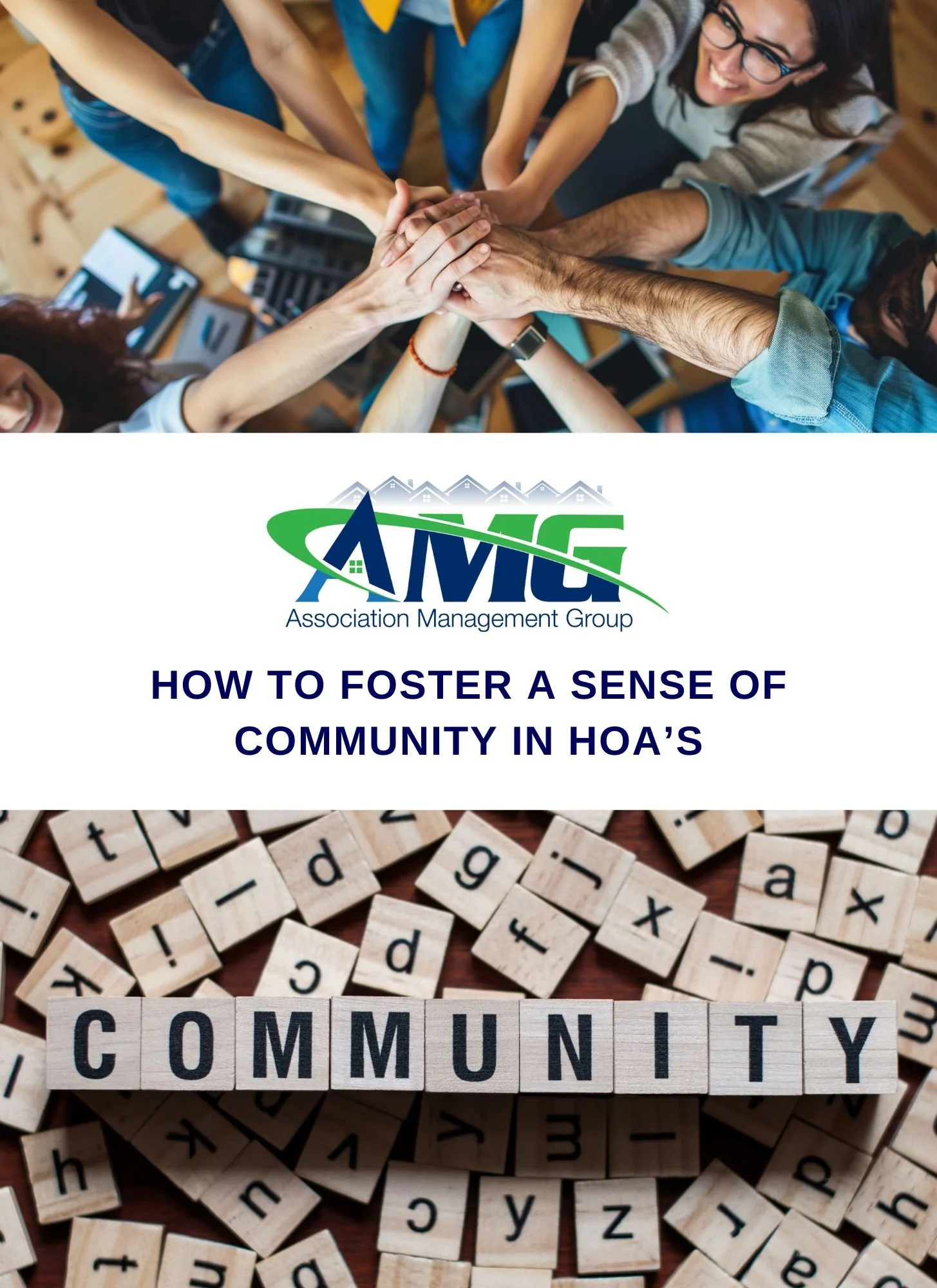How to Foster a Sense of Community in HOA's
Disclaimer: AMG provides operational support to HOA boards but does not offer legal advice. Any legal concerns should be directed to qualified legal counsel. This content is for informational purposes only.
“When neighbors become friends, a neighborhood becomes a community.”
Every neighborhood has potential—but not every neighborhood feels like home. The difference often comes down to one thing: connection. When residents feel they belong, they look out for each other, participate more, and create a positive environment that benefits everyone.
Fostering community in your HOA is not about hosting the biggest event or enforcing every rule—it’s about building a culture of respect, inclusion, and pride. And that culture starts with leadership, communication, and consistent effort from both the HOA board and management partners.
Community Culture: The Heartbeat of Every HOA
A community’s “culture” is what residents experience day to day—the tone of communication, the way neighbors interact, and how leadership responds to feedback.
Strong HOA culture leads to:
Better cooperation: Residents trust board decisions.
More volunteers: People contribute when they feel appreciated.
Improved satisfaction: Homeowners are more likely to stay involved and supportive.
A positive reputation: Welcoming communities attract future buyers.
Example: In one HOA, residents felt disconnected after years of minimal board communication. When the board began sharing monthly “good news” updates—spotlighting small improvements, volunteer shoutouts, and upcoming events—complaints dropped noticeably. The tone changed from “us vs. them” to “we’re in this together.”
Laying the Groundwork: What Boards Can Model
1. Lead with Civility and Respect
How board members conduct themselves sets the tone for the entire neighborhood.
Start meetings with a short reminder of shared values.
Model calm responses—even when discussions grow tense.
Publicly thank volunteers and residents for participation.
Tip: Consider adopting a “Community Civility Statement” or shared values pledge to reinforce positive expectations.
2. Build Trust Through Transparency
People support what they understand.
Communicate board decisions clearly—especially why they’re made.
Provide budget highlights or summaries in plain language.
Encourage open questions during meetings.
Note: HOA governance and disclosure requirements vary by state and governing documents. Consult your association’s attorney for guidance. This section is for educational purposes only.
3. Celebrate Everyday Wins
Not all engagement has to be formal. Highlight small moments of pride:
A neighbor planting flowers at the entrance.
A student’s scholarship or local award.
A family’s new baby or home anniversary.
Simple acknowledgments like “Neighbor Spotlights” in newsletters can transform your HOA’s tone from transactional to personal.
Creating Belonging: Practical Approaches
Welcome Programs That Feel Personal
The first impression matters.
Deliver a friendly “Welcome Home” packet or handwritten card.
Include neighborhood tips, key contacts, and upcoming events.
Pair new homeowners with a volunteer “neighborhood buddy.”
Story: One AMG-supported community launched a “Neighbor-to-Neighbor” welcome effort. Within six months, over 70% of new residents had attended at least one event—many becoming volunteers themselves.
Inclusive Communication
Inclusion starts with how you communicate.
Offer translated materials where appropriate.
Rotate event times to suit different schedules.
Include renters and non-owner occupants in social activities.
Use friendly, conversational tone—avoid jargon and legalese in newsletters.
Micro-Events that Build Macro-Connection
You don’t need a large budget to bring people together. Small, recurring touchpoints often do more than one big annual event.
Ideas that work:
Morning “Coffee & Conversation” drop-ins.
Monthly “Yard of the Month” or photo contest.
“Porch Light Nights” where neighbors chat outdoors.
Community book or walking clubs.
These moments create a rhythm of connection that makes larger events easier to promote later.
Handling Conflict the Community-Minded Way
Disclaimer: The following ideas are general best practices for communication and conflict resolution. They do not replace legal advice—boards should consult qualified counsel for enforcement and due process requirements.
Conflict doesn’t have to divide a neighborhood. The key is empathy, tone, and timing.
Constructive approaches:
Listen first—acknowledge frustration before explaining policy.
Offer a personal conversation before formal letters.
Focus on solutions, not penalties.
Publicly reaffirm the board’s commitment to fairness.
Story: A South Carolina HOA adopted a “Resolve, Don’t React” framework. They trained committee chairs to reach out early when issues arose. Result: fewer attorney escalations, more mutual understanding.
AMG supports boards by facilitating communication templates, mediation tools, and consistent processes that help maintain trust—even during disputes.
Keeping Momentum: How to Sustain a Connected Culture
Communities thrive when engagement becomes habit. Here’s how boards can keep connection alive:
Keep communication predictable (monthly updates, same format).
Refresh committees annually to bring in new voices.
Celebrate progress publicly—attendance growth, volunteer milestones, etc.
Ask for input annually through a resident survey. AMG assists boards by facilitating survey distribution and tracking results.
When boards show continuity and gratitude, residents reciprocate with loyalty and support.
How AMG Supports a Connected Community
AMG partners with HOAs across the Southeast to facilitate community connection, transparency, and participation.
Boards rely on AMG to:
Facilitate resident engagement tools for surveys, newsletters, and updates.
Assist with event logistics and vendor coordination.
Support training in board communication and civility.
Administer vendor documentation, including collecting Certificates of Insurance (COIs) for recordkeeping. (AMG does not verify or validate insurance coverage.)
These resources help HOA boards focus on relationships—while AMG supports structure and process.
👉 Learn more about AMG’s HOA Management Services and how we help foster connected, thriving neighborhoods.
Community Is Built in Everyday Moments
A strong sense of community doesn’t come from bylaws or budgets—it comes from small, consistent acts of kindness, communication, and care.
Try this month:
Send one “thank-you” email to volunteers.
Post a photo from your last community event.
Greet three neighbors you don’t know by name.
Ask residents what would make the neighborhood feel more welcoming.
With AMG’s support and your board’s leadership, your HOA can cultivate a culture where neighbors feel connected, respected, and proud to call their community home.
About the Author
Paul Mengert, CEO of Association Management Group, has spent over 40 years helping community associations operate more effectively, transparently, and fairly. He has personally served on HOA and condo boards in both North and South Carolina, bringing a firsthand understanding of the challenges board members face.
Paul is a nationally recognized educator who has trained managers and board members across the Carolinas and in dozens of other states. He teaches decision-making and governance strategies and is a frequent guest lecturer at Wake Forest University School of Law. Named Educator of the Year by the Community Associations Institute, Paul is known for combining deep experience with a practical, solutions-first approach that boards trust. Learn more at AMGworld.com.
-
Speaker: Paul Mengert, CEO, Association Management Group
Disclaimer
This presentation is for informational purposes only and does not constitute legal advice. AMG supports HOA boards in operational and administrative matters and refers legal questions to qualified counsel.
Introduction
Hi, I’m Paul Mengert, CEO of Association Management Group.
Today, we’re talking about something that transforms neighborhoods from groups of homes into real communities — fostering a strong sense of connection and belonging.
When residents feel engaged and respected, your HOA becomes the heart of neighborhood life. At AMG, we’ve seen that strong communities don’t just happen — they’re built on trust, civility, and transparency.
The Foundations of a Strong Community
Let’s start with those three foundations.
Trust is earned through fairness and consistency.
Civility keeps discussions productive and neighborly.
And Transparency helps residents feel informed and included.When boards lead with these values, they create a culture where people cooperate — even when they disagree.
Building Connection Through Everyday Effort
You don’t need a big budget to build community — just consistent effort.
Host simple events like porch nights, neighborhood clean-up days, or coffee mornings. Share good news in newsletters, not just reminders about rules. Invite volunteers onto committees that give residents a voice.
Example:
One HOA we support introduced a “Porch Night” tradition. Within months, participation and goodwill grew dramatically — all because people got to know one another as neighbors, not just names.Handling Conflict with Care
Every HOA faces disagreements — but how they’re handled makes all the difference.
Boards that communicate early and respectfully prevent problems from escalating. A friendly phone call or open conversation often resolves what a formal letter can’t.
At AMG, we support boards with processes and templates that promote fairness, civility, and consistency — keeping trust at the center of every decision.
Sustaining a Culture of Community
Fostering community isn’t a one-time project — it’s an ongoing practice.
Keep communication regular and positive.
Recognize volunteers.
Ask residents what makes them proud to live in your neighborhood.AMG partners with boards to make this easier — facilitating surveys, event coordination, and communication platforms that keep everyone informed and involved.
When your HOA leads with trust, civility, and transparency, residents respond with pride and participation — and that’s how real community is built.
Conclusion
Visit www.AMGworld.com to learn more or to request a consultation.
Thank you for everything you do to keep your community informed, prepared, and supported.
To view our informational pamphlet from this webinar. Click here or on the image.
AMG facilitates community association management and provides educational resources. AMG does not provide legal or financial advice. For questions involving statutes, insurance coverage, or disputes, please consult licensed professionals.
















